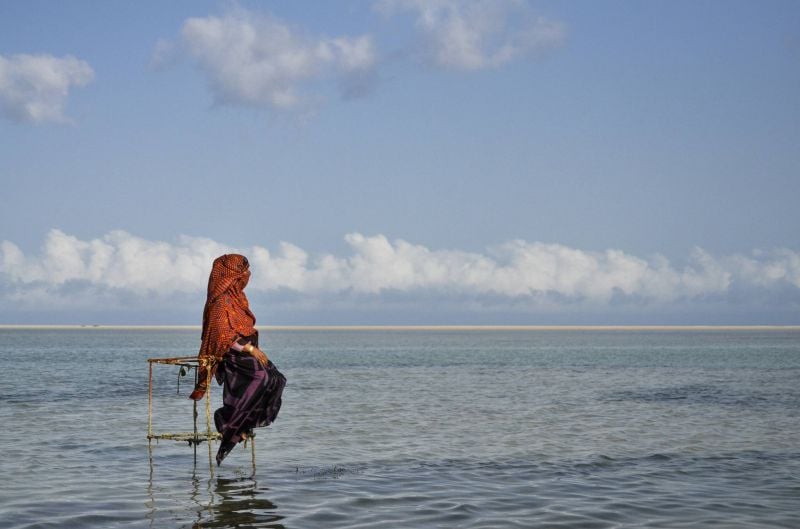
Amira Al-Sharif, ’A Love Song to Socotra Island,’ Arab Documentary Photography Program, Yemen, 2014. (Courtesy of the Arab Fund for Arts and Culture)
Rima Mismar's lighter returns to the hand-rolled cigarette and clicks once, twice, three times. The director of the Arab Fund for Arts and Culture rolled and lit the cig at the start of this chat, only to have it flag between drags. She's been doggedly trying to reignite it ever since.
“I think the challenge of AFAC being based in Lebanon over the past two years was, and still is, striking a balance between being in a place where it's really difficult not to engage with what's happening at all levels, and at the same time retain the strategic objectives of an institution that serves the whole Arab region.”
“We encountered this a lot in the last year... and it took us many meetings to ensure that whatever we are conceptualizing is not only coming from what we're living in Lebanon.”
She glances at her inert smoke and sighs.
“At the same time, despite how dire the situation is in Lebanon, I don't think that Sudan or Yemen or Syria or Egypt today are in a … better place. Crisis is not the exception. It's the norm. Trying to work within this environment ... it just became obvious what we're going to do in the next three years.”
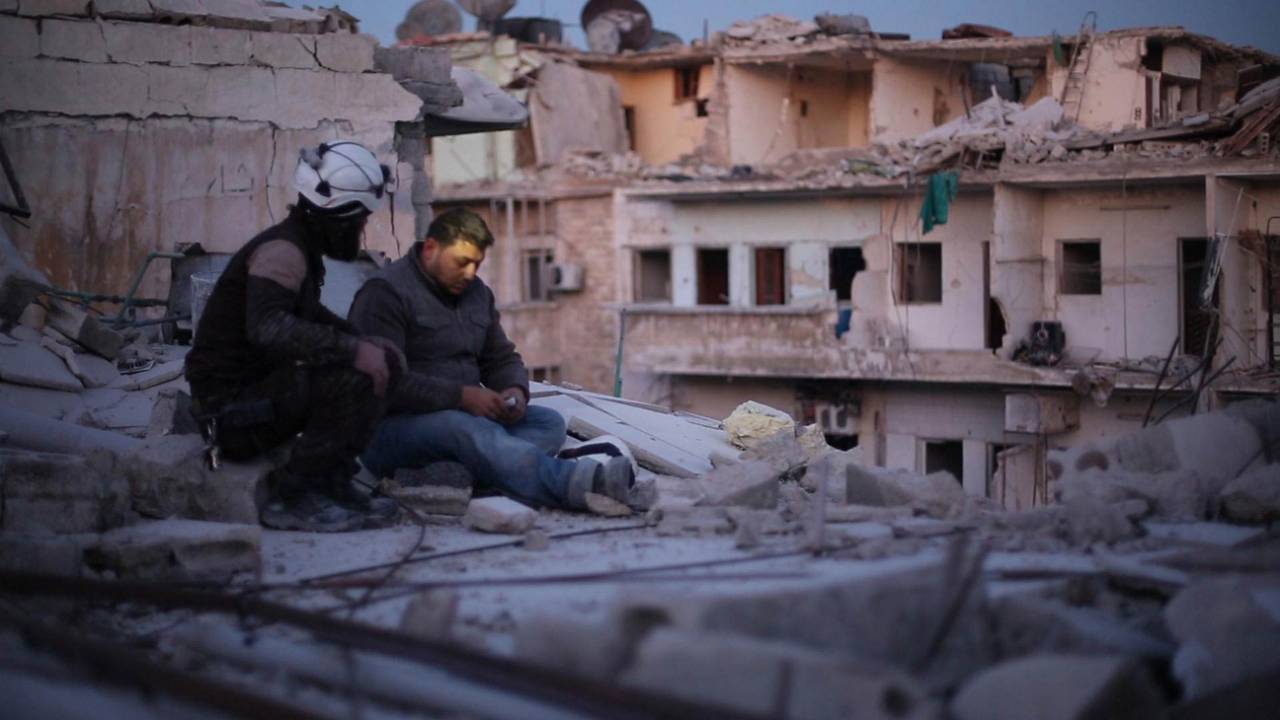 ‘Last Men in Aleppo,’ by Feras Fayyad, Syria, 2017. Nominated for Best Documentary Feature at the 90th Academy Awards and winner of the 2017 Sundance Film Festival’s World Documentary Grand Jury Prize, it was funded by AFAC’s Documentary Program. (Courtesy of the Arab Fund for Arts and Culture)
‘Last Men in Aleppo,’ by Feras Fayyad, Syria, 2017. Nominated for Best Documentary Feature at the 90th Academy Awards and winner of the 2017 Sundance Film Festival’s World Documentary Grand Jury Prize, it was funded by AFAC’s Documentary Program. (Courtesy of the Arab Fund for Arts and Culture)
Glancing back
AFAC was founded in 2007 as an independent foundation to support artists, writers, researchers, and intellectuals, as well as Arab arts and culture organizations, in (and increasingly beyond) the Middle East and North Africa (MENA) region. The fund’s programs have since diversified to include cinema (fiction and nonfiction film), photography, visual and performing arts, music, creative and critical writing. AFAC also funds research, training programs and cultural events.
For 15 years, the regional landscape for cultural production has been marked by political restrictions — authoritarianism and waves of popular protest, paramilitary violence and civil war — deepening economic inequity, contraction and collapse, and a global pandemic.
For all that, AFAC has funded some highly successful projects over the years.
The 2020 edition of AFAC’s Arab Documentary Photography Program helped to birth “The Longing of the Stranger Whose Path Has Been Broken,” a series by Egyptian photographer Rehab Eldalil that’s won several awards, including the the World Press Photo Contest Open Format (Africa), and the Premi Mediterrani Albert Camus Incipiens Award. AFAC has supported not one but two Oscar-nominated documentary films. Syrian filmmaker Talal Derki’s “Of Fathers and Sons,” funded by the 2018 Documentary Program, was nominated for Best Documentary Feature at the 91st Academy Awards, after winning the World Documentary Grand Jury Prize of the 2018 Sundance Film Festival. In 2017 another Syrian alumnus of AFAC’s Documentary Program, Feras Fayyad, took Sundance’s World Documentary Grand Jury Prize for “Last Men in Aleppo,” which also went on to be nominated for Best Documentary Feature at the 90th Academy Awards.
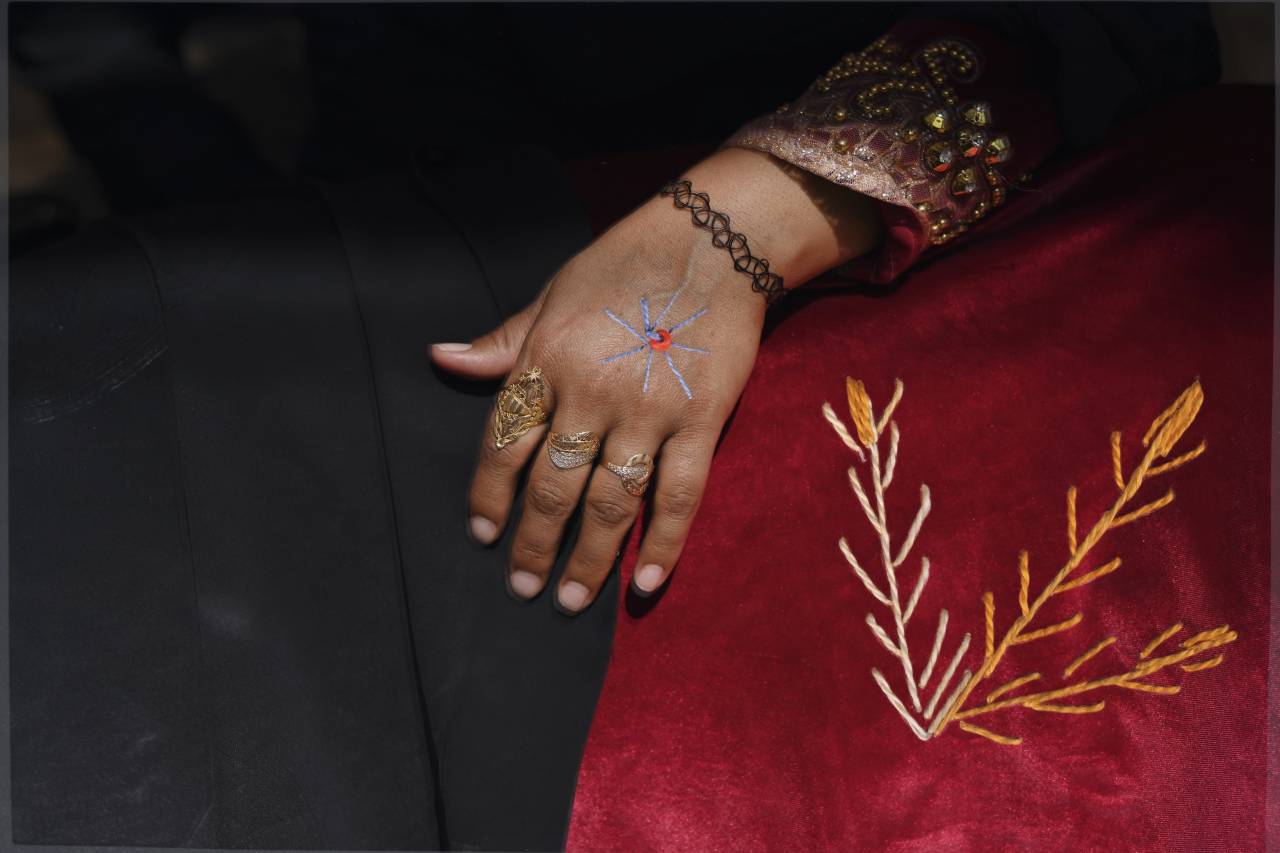 Rehab Eldalil, ‘The Longing of the Stranger Whose Path Has Been Broken,’ Egypt, 2020. Emerging from AFAC’s Arab Documentary Photography Program, this project won several awards, including the Photo W Evidence, the World Press Photo Contest Open Format (Africa), and the Premi Mediterrani Albert Camus Incipiens Award. (Courtesy of the Arab Fund for Arts and Culture)
Rehab Eldalil, ‘The Longing of the Stranger Whose Path Has Been Broken,’ Egypt, 2020. Emerging from AFAC’s Arab Documentary Photography Program, this project won several awards, including the Photo W Evidence, the World Press Photo Contest Open Format (Africa), and the Premi Mediterrani Albert Camus Incipiens Award. (Courtesy of the Arab Fund for Arts and Culture)
Lebanon has undergone its share of turmoil in the past couple of years. In the summer of 2020, AFAC and Culture Resource (Al-Mawred al-Thaqafi) collaborated to create the Lebanon Solidarity Fund, dedicated to supporting artists and cultural workers decimated by the financial crisis. A few days after the fund’s first disbursement, the Beirut port exploded — wrecking AFAC’s Gemmayzeh offices. In the aftermath, AFAC and Al-Mawred offered assistance to artists and institutions eviscerated by the blast. Mismar says the jury’s still out on the Lebanon Solidarity Fund’s over-all impact.
“When we started thinking about LSF with Al-Mawred, we knew that it is important to document and to evaluate this experience. It's important to answer questions like What does emergency support mean? How does it help? What are its shortcomings? There's a lot to learn from it and a lot to demystify.”
She relights her napping smoke.
“We knew that LSF couldn’t be an open-ended fund. We were not sure whether it would allow the institutions to survive the crisis only, or would actually allow them to continue afterward. We're still not sure.”
AFAC, and Al-Mawred have tried to take a grassroots approach to assessing the solidarity fund’s success.
“In February we held the first of two meetings that brought together all 43 of the supported institutions. We want the institutions to have some sort of review amongst themselves, a peer review guided by external consultants that will help us understand not only what the program did during this time, but also what it means that during a crisis two institutions and their donors decided to cooperate and pitch into the same pot.”
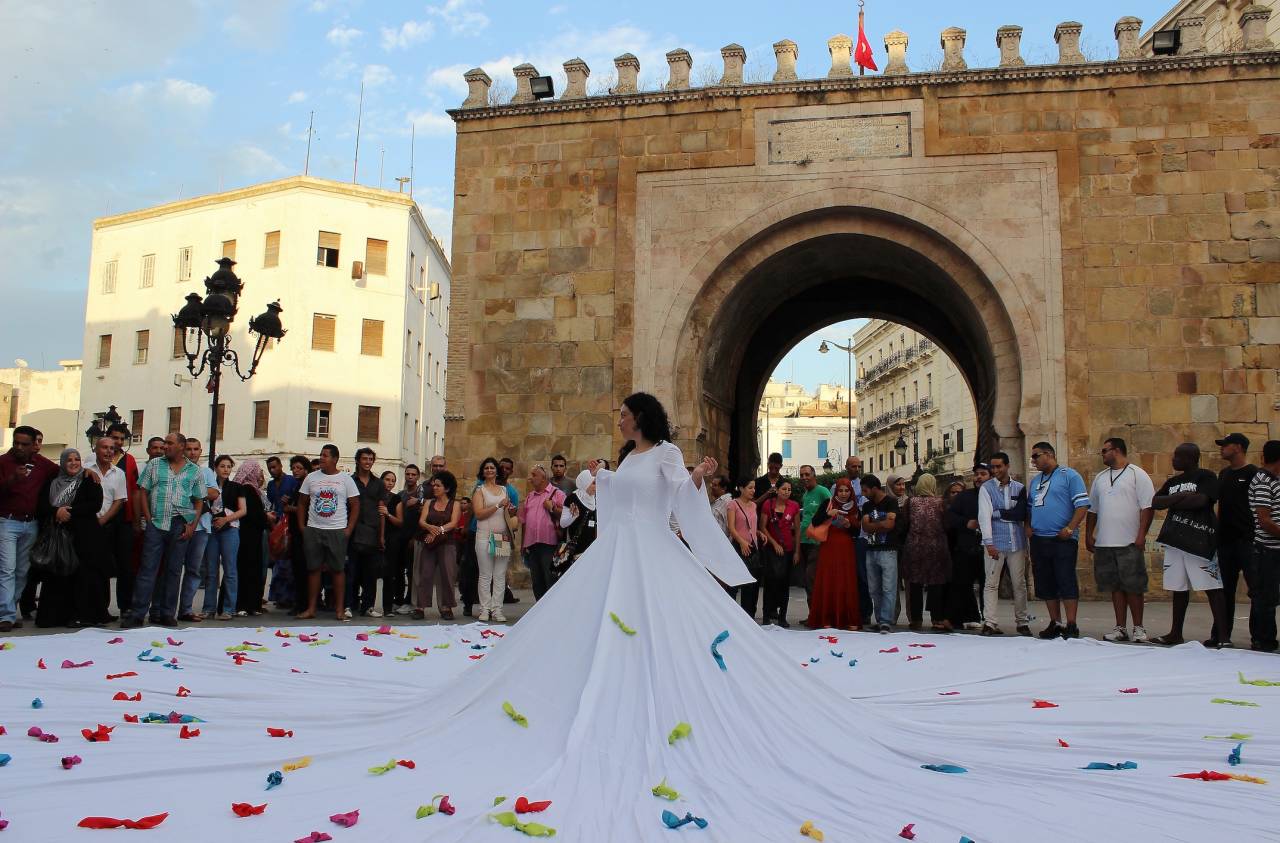 L’Art Rue, ‘Dream City 2017,’ Research, Training and Regional Events, Tunisia, 2017. (Courtesy of the Arab Fund for Arts and Culture)
L’Art Rue, ‘Dream City 2017,’ Research, Training and Regional Events, Tunisia, 2017. (Courtesy of the Arab Fund for Arts and Culture)
During that meeting, the artists and institution directors discussed questions of audience and how their perspectives of their audiences had changed and if that had influenced their programming.
“The question of institutionalization came up,” Mismar says, “and it was interesting to hear different opinions: Some are completely for institutionalizing this kind of [cultural production and exhibition], while others see [that] an entity or a collective can have an expiry date.”
These discussions are ongoing.
“I think we’re a long way from making tangible conclusions or even recommendations for others who are interested,” she says, “or who find themselves in a place where emergency response becomes a must.”
Looking forward
AFAC is celebrating its 15-year anniversary this month and several activities are being staged to mark the occasion. Aflamuna, the free regional film streaming service founded during COVID lockdown by Beirut DC (an organization of Lebanese filmmakers dedicated to supporting engaged cinema throughout the Arab world) is this month streaming a selection of 15 feature films that filmmaker Mohamed Soueid has curated from the 154 films AFAC has supported over the years. AFAC itself will stage a concert — details of which had yet to be finalized during this interview.
For her part, Mismar has been mulling over recent changes in the regional cultural landscape — both in how art is being produced and consumed and how production and consumption are inflected by collapsing national economies. Characteristically, she’s more preoccupied by the future than the past.
She lights a freshly rolled cigarette.
“Last year we started working on a new strategy that we’ll release at the end of 2022. We're also working on a series of events and pilot projects in line with the new strategy. For the 15th anniversary, we're looking into organizing a series of conferences in four or five cities, starting in July,” she says. “The main question is how can we define Arab culture today. Arab culture has been shaped by the Nahda [the 19th- and early 20th-century Ottoman Arab Renaissance, also known as the Arab Awakening or Enlightenment]. Looking at the current reality of Arab societies, what is culture today? What could it be?”
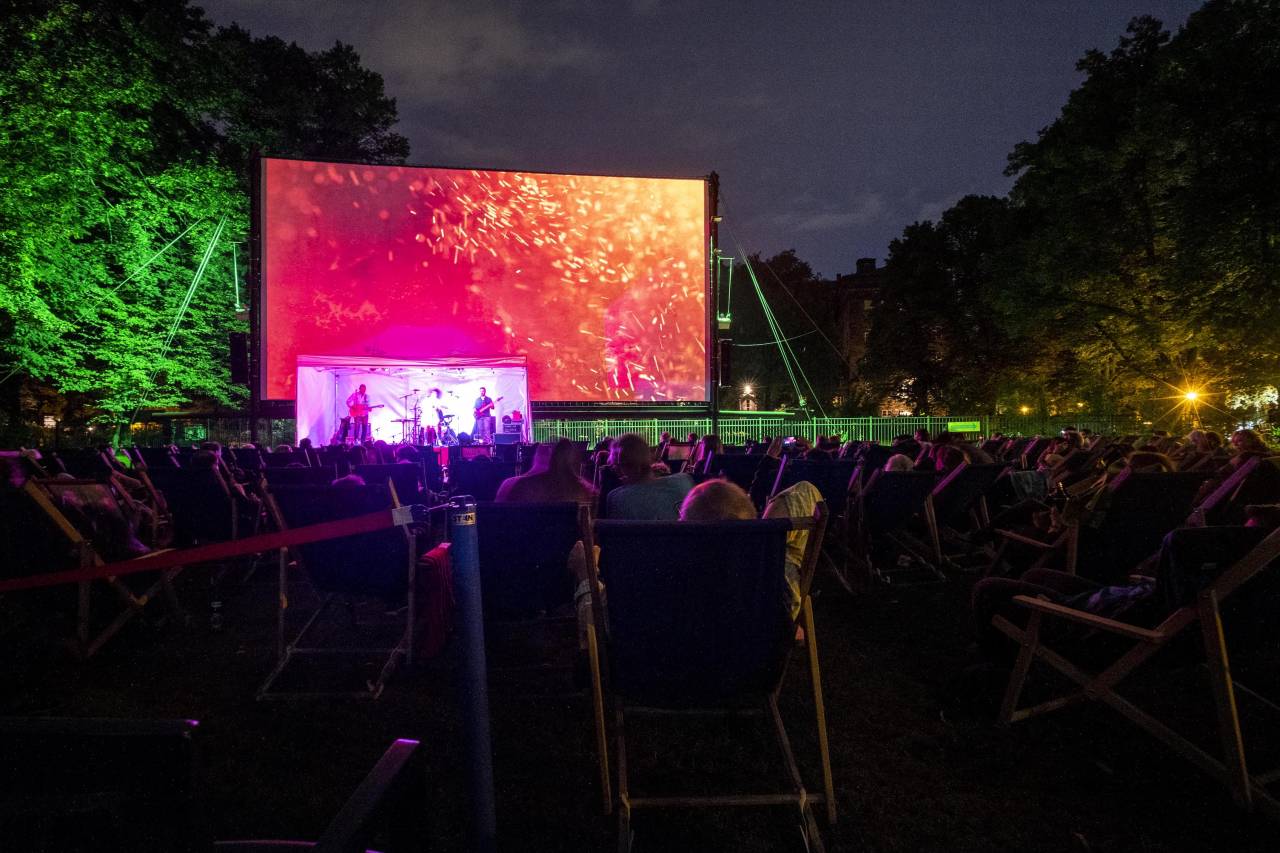 ‘Wish You Were Here,’ summer festival concert in Berlin, 2019. (Photo: Mathias Voelzke, courtesy of the Arab Fund for Arts and Culture)
‘Wish You Were Here,’ summer festival concert in Berlin, 2019. (Photo: Mathias Voelzke, courtesy of the Arab Fund for Arts and Culture)
AFAC is also commissioning a series of research papers on the performing arts, music, film, and publishing sectors, with the aim of forming a comprehensive picture of the region’s contemporary arts and culture landscape. The goal, Mismar says, is to release a policy paper addressing the sectors’ needs, challenges and deficits. It’s hoped that, in addition to guiding AFAC’s numerous programs, the paper will provide a tool for other actors who want to invest in the region’s cultural productions.
The fund’s revised strategy focuses on three axes — expanding access to culture; interrogating the economies of cultural production; and forming alliances within and beyond the arts and culture sector.
Over the next three years, AFAC will pursue two pilot projects geared to expanding access. One of them aims to cultivate critical cultural journalism.
“We have to ask ourselves if there is a real critical discourse or discourses in the region to accompany what is being produced,” Mismar says, adding, “one that asks the right questions, that pushes the sector and those that are working in it.”
For this pilot project AFAC will partner with a two nonprofit organizations dedicated to fomenting independent Arabic-language journalism — Counter Academy for Arab Journalism and the Febrayer Network.
“Counter Academy trains journalists, followed by an internship or a placement at one of the Febrayer Network’s media outlets,” Mismar says. “This is only their second year. They don’t specialize in arts and culture journalism as such, so in lieu of creating a full curriculum in 2023, they’re introducing a track that is oriented to arts and culture.”
Mismar is encouraged by the blossoming of digital platforms working to redefine the role of journalism in relation to the public and public opinion and to re-position journalism as a source of knowledge and critical thinking.
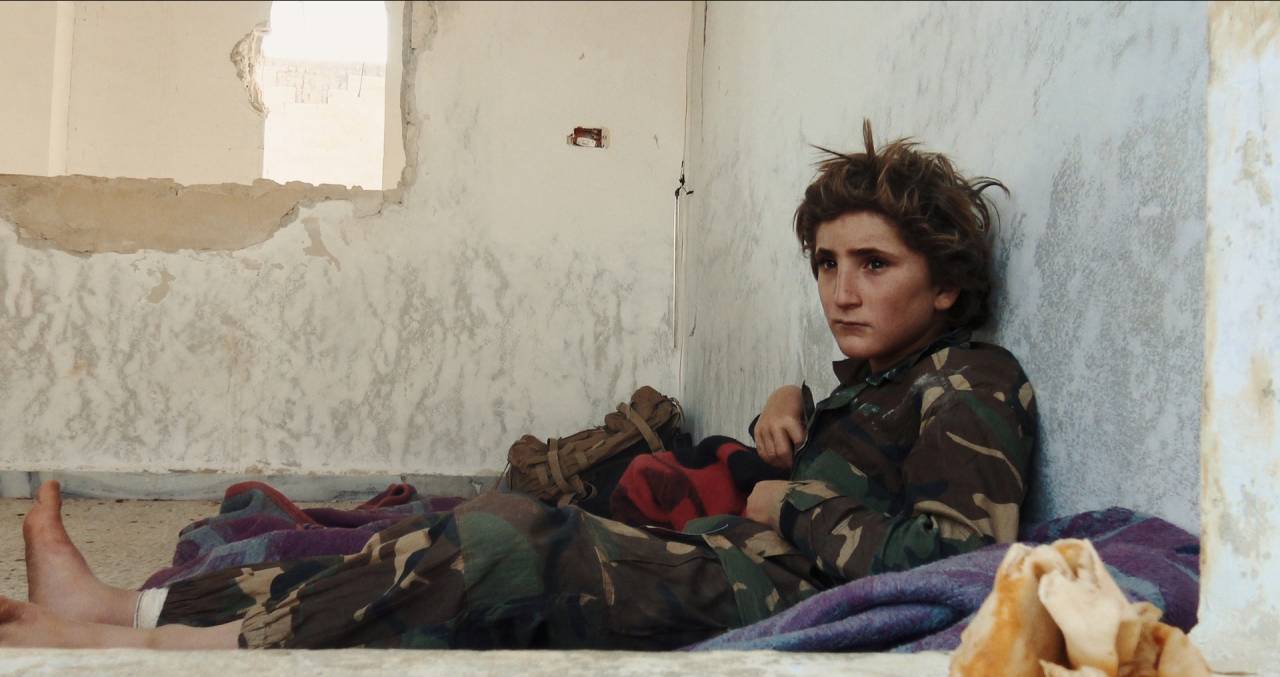 ‘Of Fathers and Sons,’ by Talal Derki, AFAC Documentary Program, 2018, was nominated for Best Documentary Feature at the 91st Academy Awards, and won the 2018 Sundance Film Festival’s World Documentary Grand Jury Prize. (Courtesy of the Arab Fund for Arts and Culture)
‘Of Fathers and Sons,’ by Talal Derki, AFAC Documentary Program, 2018, was nominated for Best Documentary Feature at the 91st Academy Awards, and won the 2018 Sundance Film Festival’s World Documentary Grand Jury Prize. (Courtesy of the Arab Fund for Arts and Culture)
“The program we’re creating can prepare young journalists not only in critical cultural journalism, but in history and philosophy and in understanding the social and political context of the region. This too is wanting in what little that is being written about arts and culture in the media: an ability to situate the work of art, whatever it is, within its political and social environment.
“So I'm hopeful. We're not looking at graduating 50 people every year to write about arts and culture,” she smiles, dropping her cigarette end in an ashtray. “The academy’s whole program has around 30 participants. We're hoping that between five and seven would be interested in pursuing the arts and culture track.
“I think it's a question of shifting the mindset, in ways that are more engaging, more political.”
Another of AFAC’s pilot projects is an episodic writing program, taking its cue from the surge in opportunities stemming from the streaming revolution — whether the international ambitions of US platforms like Netflix or regional responses like Shahid, the streaming service of Saudi’s MBC network.
“The idea is to intervene at the development and writing stage, because our own resources wouldn't make a big difference when it comes to production,” Mismar says. “Giving writers the space and the tools to develop their ideas, to come up with content that is meaningful and critical — this is the beginning of something interesting, I think.”
